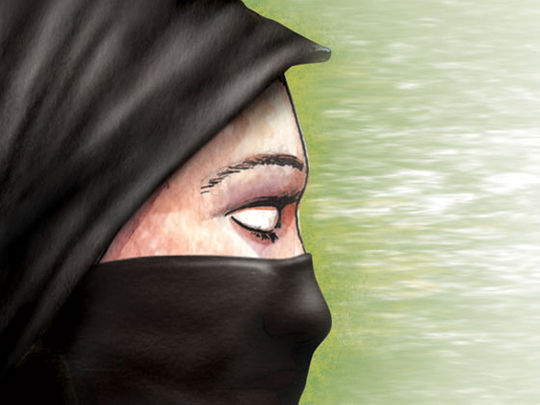
Abu Dhabi/Dubai: The controversy over full-face veils among Muslims and non-Muslims is pointless, prominent Islamic scholars said on Tuesday.
"Waging a controversy among Muslims and non-Muslims over the niqab or burqa is pointless and portrays Muslims as extremist zealots," Dr Ahmad Al Qubaisi, the head of Sharia Studies at UAE University and Baghdad University, told Gulf News.
Dr Al Qubaisi stressed the widely-accepted requirement for women's dress in Islam is long, loose clothing which leaves only the hands and face exposed. "The vast majority of Muslim scholars agree to that," he said.
Dr Al Qubaisi was speaking one day after France's ban on face veils, a first in Europe, went into force on Monday, with women wearing the niqab or burqa in public facing a fine of €150 (about Dh750), or lessons in French citizenship.
Dr Al Qubaisi, however, lashed out at France for banning full-face veils. "Staunch supporters of democracy and liberties in France and the west could not allow freedom of Muslim women to wear the niqab. Muslims who force women to wear the niqab and people in the West who deprive Muslim women from the freedom to wear it are ignorant."
The centre-right government, which passed the law in October, forbids police from asking women to remove their burqa in the street. They will instead be escorted to a police station and asked to remove the veil there for identification.
Islamophobia
Dr Al Qubaisi said it's sad that the West, which waged a war against Iraq, killing hundreds of thousands people for democracy, could not tolerate freedom of women to wear the niqab.
"If a woman chooses to cover her face … she should have the right to do so. That is freedom. I think it's absurd to pass laws that are against people's cultures and freedom. The West's Islamophobia got so severe, it made them forget the true meaning of freedom."
Shaikh Ahmad Al Haddad, the Grand Mufti of Dubai, could not agree more. He said the niqab, unlike the hijab, was not agreed by Islamic scholars to be obligatory for Muslim women.
"There is a dispute among Islamic scholars on whether the niqab is obligatory on women," he said.
He added, however, that wearing the niqab was a personal choice that is enshrined in the laws of Western states, and women should not be banned from practicing that choice.
"France, the mother of rights and democracy should have respected the rights of its citizens and residents because it is a principle of personal freedom which its constitution guarantees," he said.
France could have found other ways to discourage the wearing of the niqab without making it illegal, he said. "There are ways to reach this objective by trying to convince people, not by forcing people and threatening them with arrest," he added.
No right
He added, however, that while society had no right to force women to remove their face veils, it also did not have the right to force them to wear it. "A man has no right to tell his wife to wear the veil or not wear the veil," he said.
He dismissed claims by those French who support the ban that the niqab is a sign of male suppression of women. "I know a lot of men who would prefer for their wives to remove the face veil, but it is the woman who insists on it," he said.
In 2009, there was wide debate in Egypt on the issue of the niqab after the late Grand Shaikh of Al Azhar Shaikh Sayyed Tantawi said that the niqab is "tradition not religion" and that universities have the right to ban their female students from wearing anything that hides their facial features.
Most Emirati women agreed that the niqab ban in France is unnecessary.
Speaking to Gulf News in Dubai, Dr Mona Al Bahar, Assistant Professor at UAE University, said the ban was against human rights. "The countries that call for human rights carry out the ugliest practices against human rights," she said.
Contradiction
"People have the right to choose their religion, their clothes and their lives. When we ban a woman from wearing a niqab, shouldn't we ban women from wearing a bikini on our beaches? Why is this accepted, while that is not? I find a great contradiction and imbalance in this practice," she said.
Dr. Aisha Al Nuaimi, Assistant Professor at UAE University, said the ban has a political aspect rather than a security one.
"Nuns wear a head cover, but the Islamic hijab is viewed as a security threat, which I believe is unfair. This contradicts the principles of freedom and democracy which western countries brag about and enforces racial segregation."
Dr Alia Al Ali, a family doctor at a government clinic, said there should not be a ban on the niqab, but women can be asked to show their faces for identification purposes. Alia believes the ban may affect tourism in France. "Perhaps they will retreat when the number of tourists falls," she said.












